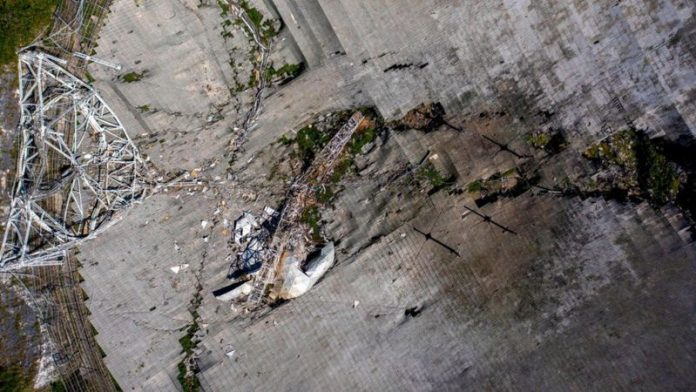The instrument platform of the 305-meter telescope at Arecibo Observatory in Puerto Rico fell at approximately 7:55 a.m. Atlantic Standard Time Dec. 1, resulting in damage to the dish and surrounding facilities.
No injuries were reported as a result of the collapse. The U.S. National Science Foundation ordered the area around the telescope to be cleared of unauthorized personnel since the failure of a cable Nov. 6. Local authorities will keep the area cordoned off as engineers work to assess the stability of the observatory’s other structures.
Top priorities are maintaining safety at the site, conducting a complete damage assessment as quickly as possible, and taking action to contain and mitigate any environmental damage caused by the structure or its materials. While the telescope was a key part of the facility, the observatory has other scientific and educational infrastructure that NSF will work with stakeholders to bring back online.
“We are saddened by this situation but thankful that no one was hurt,” said NSF Director Sethuraman Panchanathan. “When engineers advised NSF that the structure was unstable and presented a danger to work teams and Arecibo staff, we took their warnings seriously and continued to emphasize the importance of safety for everyone involved. Our focus is now on assessing the damage, finding ways to restore operations at other parts of the observatory, and working to continue supporting the scientific community, and the people of Puerto Rico.”
The investigation into the platform’s fall is ongoing. Initial findings indicate that the top section of all three of the 305-meter telescope’s support towers broke off. As the 900-ton instrument platform fell, the telescope’s support cables also dropped.
Preliminary assessments indicate the observatory’s learning center sustained significant damage from falling cables.
Engineers arrived on-site today. Working with the University of Central Florida, which manages the observatory, NSF expects to have environmental assessment workers on-site as early as tomorrow. Workers at the observatory will take appropriate safety precautions as a full assessment of the site’s safety is underway.
NSF intends to continue to authorize UCF to pay Arecibo staff and take actions to continue research work at the observatory, such as repairing the 12-meter telescope used for radio astronomy research and the roof of the LIDAR facility, a valuable geospace research tool. These repairs were funded through supplemental congressional appropriations aimed at addressing damage from Hurricane Maria.
Once safety on site is established, other work at the observatory will be carried out as conditions permit.





























